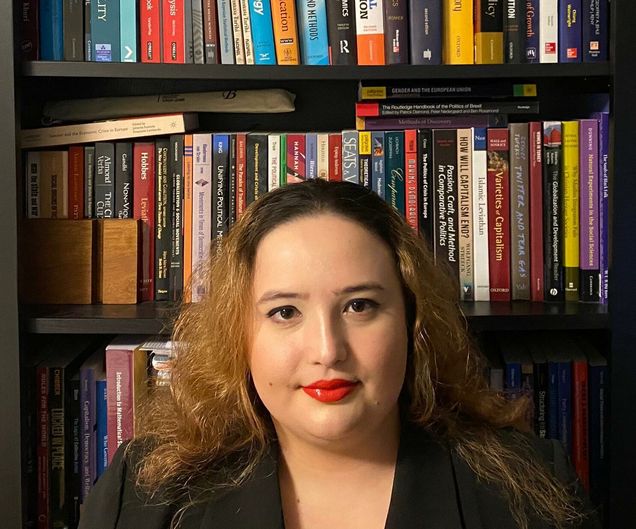Q&A Interview with Graduate Affiliate Gizem Kaftan
 Gizem Kaftan received her Bachelor of Arts in International Relations and Sociology from Koç University, Turkey. At Koç University, she was an undergraduate research assistant and worked on Latin American politics, labor-state relationships, and Turkey’s fiscal and monetary policy. Gizem received her Master of Arts in International Affairs with a concentration in International Public Policy from Northeastern University. At Northeastern University, Gizem worked as a research assistant on a grant-funded project related to sanctuary cities in which she transcribed and analyzed data collected via interviews. She was also a graduate teaching assistant in a class on Brexit. At Boston University, she was a teaching assistant for Quantitative Methods I and Data Science for Politics courses. She received an outstanding teaching fellow award in the 2020-2021 Academic Year. Gizem is interested in European Union politics, populism, nationalism, gender politics, and quantitative methods. Her current research analyzes the European Union’s response to the internal democratic challenges. Her most recent work was published at Nationalities Papers. Learn more about Kaftan below in a short Q&A interview with CISS Communications Manager Lily Belisle.
Gizem Kaftan received her Bachelor of Arts in International Relations and Sociology from Koç University, Turkey. At Koç University, she was an undergraduate research assistant and worked on Latin American politics, labor-state relationships, and Turkey’s fiscal and monetary policy. Gizem received her Master of Arts in International Affairs with a concentration in International Public Policy from Northeastern University. At Northeastern University, Gizem worked as a research assistant on a grant-funded project related to sanctuary cities in which she transcribed and analyzed data collected via interviews. She was also a graduate teaching assistant in a class on Brexit. At Boston University, she was a teaching assistant for Quantitative Methods I and Data Science for Politics courses. She received an outstanding teaching fellow award in the 2020-2021 Academic Year. Gizem is interested in European Union politics, populism, nationalism, gender politics, and quantitative methods. Her current research analyzes the European Union’s response to the internal democratic challenges. Her most recent work was published at Nationalities Papers. Learn more about Kaftan below in a short Q&A interview with CISS Communications Manager Lily Belisle.
What made you decide to be a social scientist/ why does social science matter to you?
Since childhood, I have been interested in political affairs, especially about the European Union (EU). In 1999, Turkey was given an EU member state candidacy, meaning that Turkey could become an EU member if it abides by the agreements drawn out by the EU. As a child, this topic was highly contested on TV, especially in the news, which made me more interested in the EU.
Social science matters to me because I believe that with social science research, it is possible to understand and make sense of the world, primarily complicated phenomena like politics.
Can you tell us about a recent research project that you’re excited about?
I am working on the empirical part of my dissertation project, which tries to understand the EU’s behavior towards illiberal policies enacted in the existing EU member states. I specifically look at Poland and Hungary and examine the difference between the EU’s behavior towards these countries. I argue that the EU has punished Poland more harshly than Hungary, especially in areas of the rule of law and judicial independence, even though Hungary was the first offending country and implemented policies that impeded judicial independence more seriously than Poland. I am trying to understand how the elected officials strategized while enacting these policies and whether elected officials’ decisions affected EU behavior.
What is the best piece of professional advice you ever received?
I should continue doing research and publish as many papers as I can. I should start doing research early in my academic career.
Tell us a surprising fact about yourself.
I am a first-degree black-belt Shotokan karate practitioner (karateka (空手家)).